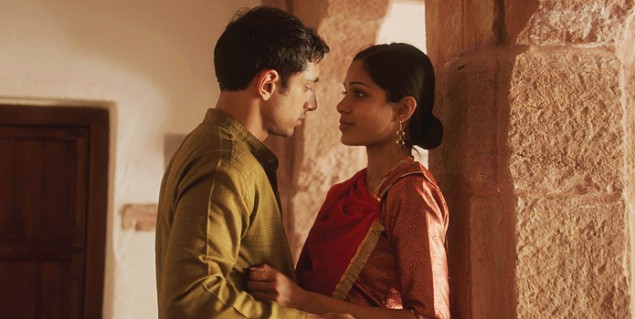Showing @ Cameo Cinema, Edinburgh until Thu 15 Mar & Thu 22 Mar
Michael Winterbottom / UK / 2011 / 117 mins
It’s sometimes forgotten that the original serial version of Thomas Hardy’s Tess of the d’Urbervilles was incredibly severe. It included rape, infant death and murder, elements which fiercely harden the symbolic register of the story, yet are absent here in Michael Winterbottom’s attractive, but slightly frail, adaptation.
Winterbottom relocates Hardy’s tragedy to India where Jay (Riz Ahmed), the son of a successful hotel-owner in Rajasthan, falls in love with Trishna (Freida Pinto) after a couple of chance meetings. As the pair move to Mumbai however to settle in urban, middle-class lifestyle, Trishna longs for her former life and must face the intensifying pressure on her relationship with Jay.
The dusty, orange landscape of rural Rajasthan clashes hard against the metropolitan environment of Mumbai – a fact which gives Winterbottom’s adaptation more clout in today’s age of advancing divisions in society (and matches Hardy’s desire to censure modern society). In many ways, it’s a wise choice to transfer the story as it, quite obviously, universalises Hardy’s tale but at the same time allows Winterbottom to experiment with eastern traditions through western eyes. While this can often be a dangerous task for directors, it fits in with Winterbottom’s customary attempts at challenging prescriptive outlooks and watery ambitions.
His decision to omit certain features from the original story sentimentalises his film however. Jay and Trishna’s relationship is more yuppie than it should be and it loses a true sense of fated tragedy which stalks the overall narrative. Ahmed and Pinto give charged performances, perhaps slightly lacking a bit of edge, which are believable enough but fail to do Hardy’s characters any real justice. The true battle Winterbottom faces here is in modernisation; he has adapted Tess quite efficiently but has failed to capitalise on the observations made on industrial society, something which if done correctly, will tell us more on contemporary living than trashy reports published in the world of journalism and even academia today could ever hope to achieve.


One thought on “Trishna”